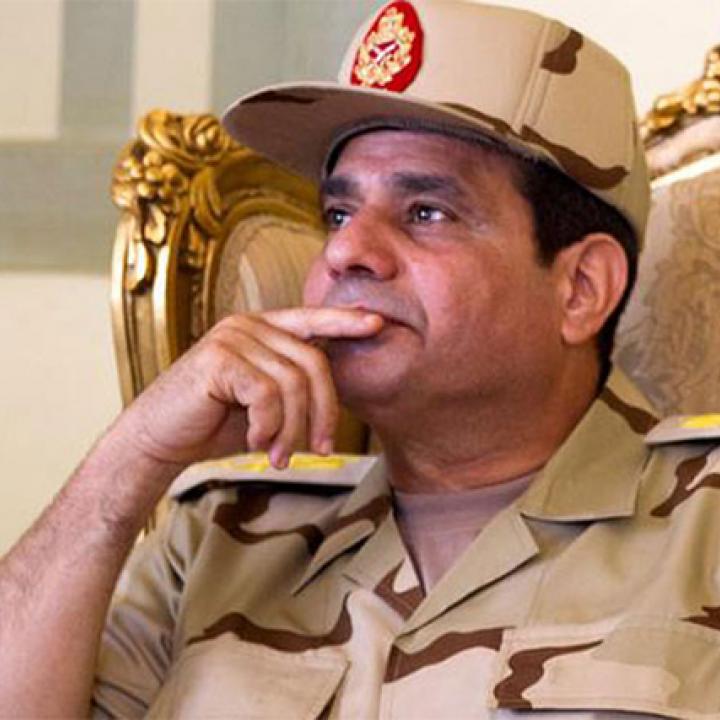
- Policy Analysis
- Policy Alert
Sisi’s Anti-Israel Rhetoric: New Speeches, Old Problems

Despite broadening official cooperation between the two states, he is increasingly embracing the old approach of telling Egyptians that Israel is the enemy.
On October 11, Egyptian president Abdul Fattah al-Sisi gave a speech at an event commemorating the forty-fifth anniversary of the 1973 Yom Kippur War/October War, traditionally touted as a glorious victory over Israel. Every year, dozens of Egyptian pundits write celebratory articles, news anchors host soldiers who participated in the conflict, and television channels broadcast songs and movies depicting the heroic actions of the Egyptian army. This tendency has been alive and well the past few years despite the uptick in Egyptian-Israeli cooperation on combating terrorism in the Sinai Peninsula and handling Hamas in the Gaza Strip. It is also in line with the local media’s general anti-Israel slant—during Ramadan this past June, for example, one Egyptian television show fantasized about an Israeli spy supposedly managing an al-Qaeda affiliate inside Egypt.
At the beginning of his tenure, however, President Sisi’s discourse toward Israel mostly revolved around peace, cooperation, and acceptance. And his previous five high-profile speeches marking the war’s anniversary focused on the special bond between the Egyptian people and army, as well as the internal challenges facing Egypt and Israel. This year, however, for the first time since coming to power, he used the speech as an occasion to remind the people why Israel is still their enemy.
Specifically, he claimed that the conflict between the two countries has evolved rather than ended. While their armies do not fight directly anymore, the conflict persists. “The battle didn’t end,” he remarked last week. “In the past, the enemy was obvious. Now, it is not. Now, they are with us and inside us. They were able to create an enemy inside us that survives by killing us. And gets built by our destruction.” He continued: “A big part of the challenge is building our awareness. What I consider the main enemy is incomplete awareness, or fake awareness. It requires us—not only on the level of intellectuals, thinkers, and the media, but more than that—to be fully aware of the reality we are in.”
Some members of the Egyptian media were receptive to the president’s relatively aggressive rhetoric against Israel. On October 12, the state-run al-Ahram newspaper published an article titled “Zionist Channels to Penetrate the Egyptian Mind.” The author reiterated Sisi’s remarks about “awareness,” elaborating on how Israel has allegedly brainwashed young Egyptians to perceive it as a peaceful friend by, for instance, espousing closeness between younger “Zionists” and Egyptian youths. According to the article, Israel aims to ensure its security by sowing the seeds of disloyalty among these youths and making them forget about the Palestinian issue.
WHAT IS SISI TRYING TO ACCOMPLISH?
Since coming to power, Sisi has extensively referred to such fourth-generation warfare when railing against American foreign policy in the region, but he is increasingly turning this theme against Israel as well. To be sure, past Egyptian leaders often used anti-Israel rhetoric to boost their legitimacy during times of economic or political crisis, fostering negative public attitudes that impeded normalization for decades. Unlike his predecessors, however, Sisi lacks even the baseline legitimacy accorded by a proven military track record. Hence, he is trying to convince the public that the current situation is similar to what Egypt faced during its wars against Israel in 1967, 1968-1970, and 1973.
Sisi is very aware of growing public frustration stemming from the country’s bitter economic and social conditions. By using Israel as a scapegoat, he may be trying to mobilize the public around the military. Recently, the Muslim Brotherhood and terrorism were his major national adversaries. Now, with the full containment policies imposed on the Brotherhood by his security apparatus and the noticeably diminished number of terrorist attacks, he apparently believes that the nation needs a more sophisticated enemy to justify the military’s domination of public life, economic or otherwise.
Finally, Sisi seems to have gotten what he wanted from Israel-friendly organizations in the United States, which helped him tone down the Obama administration’s sanctions. He may now feel that his legitimacy is anchored in Washington. President Trump met with him multiple times and gave him the recognition he yearned for, praising his efforts to combat terrorism in the region. Even so, government-run newspapers continue to criticize Trump’s regional policies to their domestic audiences, perpetuating the “fourth-generation warfare” theme in order to bolster Sisi’s claims that Egypt needs to stay on guard.
POLICY RECOMMENDATIONS
Cairo remains an essential component of any future Palestinian peace process, but the Sisi government’s deep anti-Israel propaganda is a persistent stumbling block. The Trump administration needs to convey more signals to tone down the political leadership’s rhetoric against their eastern neighbor. Such statements will not help the administration promote an Israeli-Palestinian peace plan. Moreover, this narrative could cause a flare-up in Egyptian-Israeli tensions at any time if left unchecked.
Haisam Hassanein was the 2016-2017 Glazer Fellow at The Washington Institute.


